Rimanas Elizejus passed away February 12. He was born in 1924. He was a Community member of long standing and a client of the Saul Kagan Welfare Center. We extend our deepest condolences to his children and all of his friends and relatives.
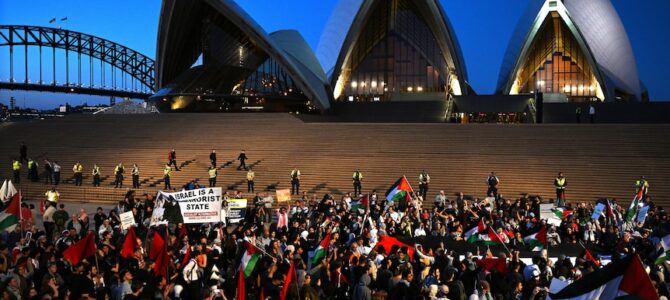
Aussie Deputy Police Commish Gives Cover to Anti-Semitic Pogrom
Deputy police commissioner for the Australian state of New South Wales Mal Lanyon seemingly pulled a page from the Lithuanian playbook last week, providing cover for a mob hellbent on pogrom at the Sydney Opera House who chanted “gas the Jews” on October 9, before Israel initiated its self-declared war on Hamas in the Gaza Strip.
According to Lanyon, Strike Force Mealing, a special working group tasked with investigating possible criminal offenses at the gathering, hired an acoustics expert who reviewed audio recordings and decided the crowd was actually chanting “Where’s the Jews?” despite numerous ear-witnesses at the event and voluminous video footage which indicated they had in fact clearly chanted “Gas the Jews!”
“The expert has concluded with overwhelming certainty that the phrase chanted during that protest as recorded on the audio-visual files was ‘where’s the Jews,’ not another phrase as otherwise widely reported,” he said.
The day after the protest, NSW oremier Chris Minns had condemned the rally, describing it at “abhorrent.”
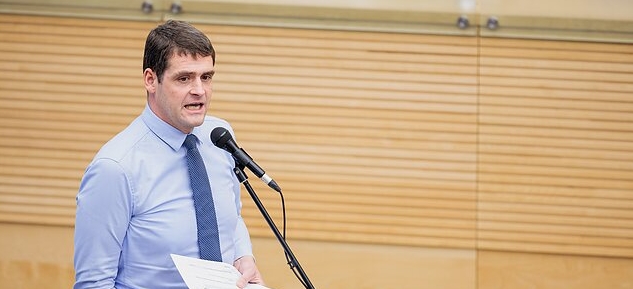
Lithuanian Parliament to Remove Immunity from Allegedly Anti-Semitic MP
by Modesta Gaučaitė-Znutienė, February 12, 2024
The Lithuanian parliament has green-lighted the removal of parliamentary immunity from Remigijus Žemaitaitis for his comments allegedly belittling Jews. Žemaitaitis counters his comments were not anti-Semitic and claims the accusations are political because he decided to run for president.
The Office of Prosecutor General made the request to parliament to annul Žemaitaitis’s legal immunity because of allegedly anti-Semitic comments the MP made on facebook. The MP says this is an attempt to get rid of him ahead of the presidential election in May.
Prosecutor general Nida Grunskienė took to the podium in parliament telling lawmakers the pre-trial investigation into alleged anti-Semitic statements by Žemaitaitis was launched on May 8 last year and involves the possible sowing of discord against a national, racial, ethnic, religious or other group of people.

Discussion Club: Is Lithuanian Anti-Semitism Different from European?
The #ŽydiškiPašnekesiai Jewish discussion club this week will address the topic of anti-Semitism in Lithuania and Europe. While there aren’t thousands marching in support of the Hamas terrorist group in Vilnius, and anti-Semitic attacks are relatively infrequent compared to some countries, there is a kind of institutionalized anti-Semitism at work in the bureaucracy, despite the periodic condemnation of anti-Semitism by the so-called political elite. Traditional Shrovetide processions continue to include caricatures of Jews, school children are still exposed to anti-Semitism from teachers and “memory wars” continue in the public space with Lithuanian Nazis glorified and Righteous Gentiles ignored. If anti-Semitism in Western Europe is largely fueled by Muslim immigrants, what’s Lithuania’s excuse?
Is there a way out of this existing labyrinth, and if so, what is it?
We’ll look for answers with historians Egidijus Aleksandravičius and Linas Venclauskas in a panel discussion in Lithuanian moderated by Arkadijus Vinokuras..
Time: 5:00 P.M., Wednesday, February 14
Place: Bagel Shop Café, Pylimo street no. 4., Vilnius
The discussion will be streamed live at https://www.facebook.com/zydubendruomene/live_videos/

Trudeau Did Invite Nazi After All
Canadian state media outlet Canadian Broadcasting Corporation and other Canadian media are reporting Canadian prime minister Justin Trudeau did issue an invitation to Ukrainian Waffen-SS solider Yaroslav Hunka to attend an event on September 22, 2023, after all.
Hunka was given a standing ovation at the Canadian House of Commons in Ottawa that day. Honoring the Nazi at parliament was widely seen as an insult to Canadian Jews and Holocaust survivors around the world. It also detracted from the Canadian brand as a multi-cultural oasis of tolerance in the world, and shone a light on Canada’s practice of providing haven to Nazi war criminals on the lamb from justice, including the Butcher of Kaunas, Helmut Rauca.
Speaker of parliament Anthony Rota from Trudeau’s own Liberal Party apologized for the incident and took “full responsibility,” announcing his resignation September 26 to take effect on September 27, 2023.
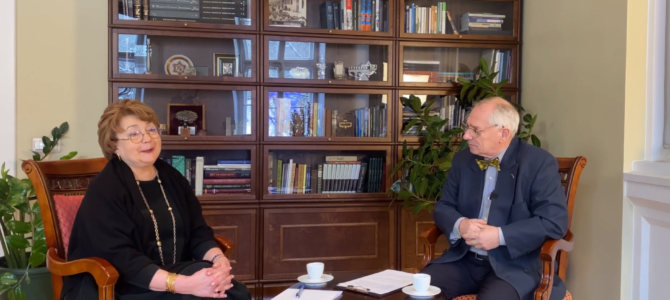
Interview with LJC Chairwoman Faina Kukliansky
“As the chairwoman of the Lithuanian Jewish Community, I see my greatest assignment as not letting others forget we are Jews, and not letting Jews forget they are Jews,” LJC chairwoman and attorney Faina Kukliansky said in an interview Arkadijus Vinokuras conducted in Lithuanian for the Jewish discussion club #ŽydiškiPašnekesiai he founded and leads.
In the interview they discussed Community activities, money, protection of wooden and other synagogues, relations with ethnic Lithuanians, Holocaust and Righteous Gentile commemoration policies and the lack thereof, care for senior citizens including Holocaust survivors, cemetery maintenance, relations between the regional Jewish communities in Lithuania, a new kosher food outlet in Vilnius, anti-Semitism in the EU and Lithuania as well as the Lithuanian bureaucracy, the Vilna Gaon Jewish History Museum’s new Litvak identity museum and the future. The full interview in Lithuanian can be found below. Duration: 54:20.
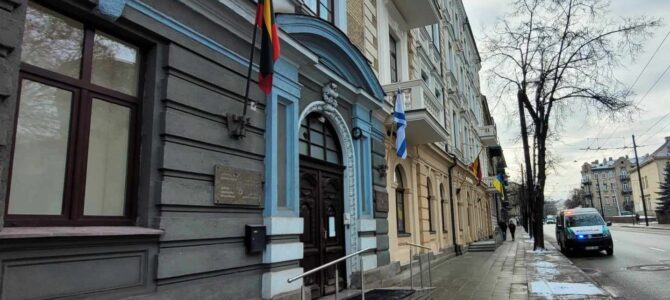
LJC Requests Protection from State after Latest Act of Vandalism
Monday evening security cameras at the Lithuanian Jewish Community in Vilnius recorded a person who threw a rock at the building and broke the glass above the main entrance. Police were contacted immediately.
This is yet another unprovoked anti-Semitic attack against Lithuanian citizens of Jewish descent reflecting inimical attitudes in society which perhaps have been escalated by anti-Jewish rhetoric in parliament and by propaganda from supporters of the Hamas terrorist group.
The LJC is not a political organization. We are an organization which is concerned with the social and cultural life of the Jews of Lithuania. Among our activities are infant, child and youth clubs and the Saul Kagan Social Welfare Center which takes care of our senior citizens with home-care and activities at the Community. Fortunately enough, when the act of vandalism was committed, there were no passers-by on the sidewalk outside nor people inside where the broken glass landed, and no one was physically hurt. Nonetheless, these sorts of incidents could end very badly. This is by no means the first anti-Semitic attack against Jewish communities in Lithuania. Very recently someone threw stones through the windows of the Šiauliai Jewish Community.
We have also received information concerning Nazi and White Power symbols graffitied on a pedestrian bridge in Vilnius. We contacted the police concerning this as well, since Lithuanian laws forbid the propagation of totalitarian and authoritarian regimes, their ideologies and their symbols.
Just recently in January at a meeting held at the European Commission all member-states in a special working group presented progress reports on the implementation of the European Union strategy for combating anti-Semitism and fostering Jewish life. We are sad to report this strategy is being implemented very poorly in Lithuania with an ever-growing frequency of anti-Semitic attacks. And, judging from what’s going on in other countries, this is only the beginning of a rising tide of anti-Semitism. Sadly, our state is failing to insure adequate security at important Community sites, including the Choral Synagogue in Vilnius, the LJC, the Sholem Aleichem ORT Gymnasium in Vilnius and the Salvija kindergarten where many Jewish families send their toddlers.
The Lithuanian Jewish Community asks the appropriate and engaged public organizations for help in this, and for security from the corresponding state institutions. The situation in other countries clearly shows we are a footstep away from real human tragedy and misfortune.
Condolences
Gercas Borveinas passed away February 6. He was born in 1935. He was an LJC member and Saul Kagan Welfare Center client.
Lithuanian Jewish Community chairwoman Faina Kukliansky and the entire Community extend our deepest condolences to all who knew and loved him.
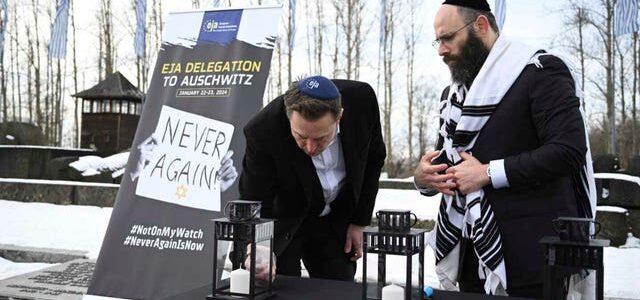
Elon Musk Expresses Shock about the Holocaust
Elon Musk expresses shock about the Holocaust after Auschwitz visit that was “incredibly moving, and deeply sad and tragic that humans could do this to humans.”
Elon Musk took a private tour of the Auschwitz-Birkenau concentration camp in southern Poland on January 22 as he defended his social platform, X, against accusations of spreading anti-Semitism.
“It was incredibly moving, and deeply sad and tragic that humans could do this to humans,” the billionaire Tesla, Inc. chief and X owner said on Monday of the site where an estimated 1.1 million people, mostly Jews, were killed by the Nazis during World War II.
Musk was seen carrying his son on his shoulders in a photo of the tour, as he stood alongside Rabbi Menachem Margolin, the chairman of the European Jewish Association, Holocaust survivor Gidon Lev, and Ben Shapiro, a controversial conservative media pundit. Shapiro later hosted a discussion with Musk organized by the EJA in nearby Cracow.
Full story here.
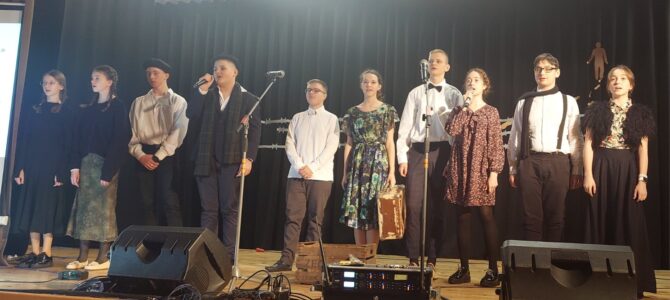
Youth from around Lithuania Gather in Ariogala to Remember Holocaust Victims
Lithuania’s International Commission for Assessing the Crimes of the Nazi and Soviet Occupational Regimes in Lithuania and the Ariogala gymnasium staged an artistic performance/conference called “Children during the Holocaust” to mark International Holocaust Day last week, with performances and presentations by school children.
Kaunas Jewish Community chairman Gercas Žakas told the gathering: “In these times bringing us so much sadness, darkness and hate, one of the strongest sources of hope and comfort that maybe someday someone will learn the painful lessons of history is young people and their teachers, expending their time, energy and creativity not just for achieving good academic results, but also for raising people who are good, who are sincere people, eager to learn, tolerant, civic-minded, who are not apathetic towards the problems and hurtful experiences of the world and other members of society.”
Israeli ambassador Hadas Wittenberg-Silverstein and US embassy deputy secretary and vice-consul William Kendrick attended the event, as did Raseiniai regional administration deputy mayor Mindaugas Tamaliūnas.
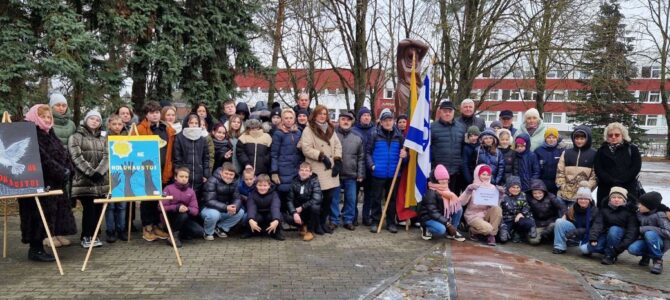
International Holocaust Day in Panevėžys
The Lithuanian city of Panevėžys commemorated International Holocaust Day last Friday. January 27 is the day the United Nations chose for the memorial date as the day when Auschwitz was liberated. About 1.5 million people were murdered at this Nazi concentration camp located in Poland.
Panevėžys deputy mayor Žibutė Gaivenienė, Panevėžys regional administration deputy mayor Edmundas Toliušis, Rožynas community chairwoman Romualda Šerplienė, teachers and students from the Vyturys school and members and staff of the Panevėžys Jewish Community attended and participated in the event.
“Today the entire world commemorates International Holocaust Day. This tragedy during World War II was planned by the leadership of Nazi Germany. Innocent civilians were murdered. The whole world recognizes the Holocaust must not be forgotten. We cannot forget the people who were brutally tortured and murdered. And to those who are trying to erase this from the memory of today’s youth: for shame!” Gennady Kofman said at the commemoration.
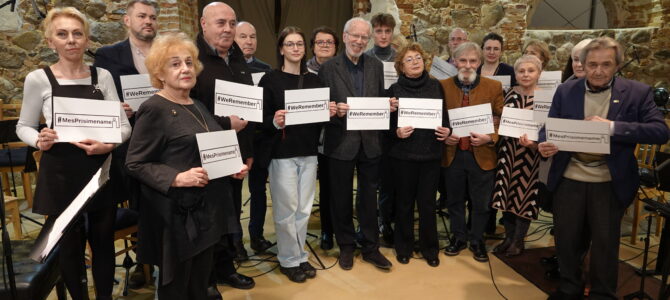
International Holocaust Day Marked at Paliesius Manor with Concert
The Paliesius Manor house in the Ignalina district of Lithuania hosted a concert to mark International Holocaust Day on January 27 by maestro Gidon Krember and the Kremerata Baltica chamber orchestra. Many thanks to all those who made this possible, including Gidon Kremer, Lithuanian Jewish Community chairwoman Faina Kukliansky, the Paliesius Manor estate, professor Julius Ptašek, LJC board member Ela Gurina, Sholem Aleichem ORT Gymnasium principal Ruth Reches, LJC executive director Michailas Segal, Fayerlakh Jewish song and dance ensemble director Larisa Vyšniauskienė, LJC programs director Žana Skudovičienė, Švenčionys Jewish Community chairman Moshe Shapiro, Panevėžys Jewish Community chairman Gennady Kofman and everyone who attended.
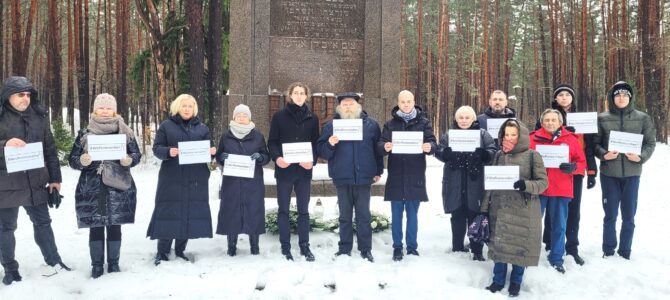
Kaddish in Ponar
Choral Synagogue cantor Shmuel Yaatom performed kaddish at the Ponar mass murder site outside Vilnius on International Holocaust Day last week.
Lithuanian Jewish Community chairwoman thanked the Israeli embassy and chargé d’affaires Erez Golan, Švenčionys Jewish Community chairman Moshe Shapiro, young people from the Sholem Aleichem school and all members of the community who turned out to pay their respects to the victims of the Holocaust at Ponar and who came to pay their respects to those who rescued Jews at the monument dedicated to their memory in Vilnius.
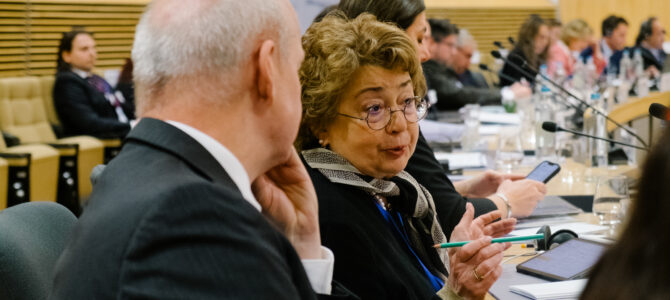
Situation of Lithuanian Jewish Community Presented in Brussels
Last week the European Commission convened the fifth meeting in Brussels of a working group dedicated to combating anti-Semitism and fostering Jewish life in the European Union with Lithuanian Jewish Community chairwoman and attorney Faina Kukliansky representing Litvaks.
It was the first meeting of the working group since Hamas’s attacks on Israelis on October 7.
The first day of meetings discussed attacks on Jewish communities in the EU and measures taken at the national and European level to address the largest wave of anti-Semitism in Europe since the Holocaust. European Commission vice president Margaritis Schinas responsible for propagating the European way of life began the meeting by reiterating the EC’s resolute pledge to insure the continuation and thriving of Jewish life in the EU.
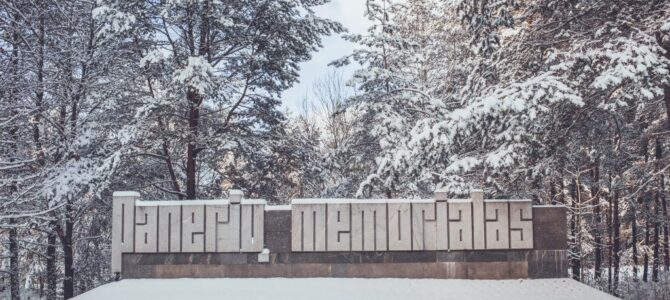
#WeRemember
The Lithuanian Jewish Community invites all members of the public to mark International Holocaust Day on January 27 by taking part in the global We Remember campaign to keep alive the memory of the six million Jews murdered in the Holocaust.
Every year the LJC addresses the Lithuanian municipalities and educational institutions requesting they join the We Remember campaign by visiting mass murder sites, maintaining grave sites, relaying the testimonies of eyewitnesses to the Holocaust and telling the horrific story which had such tragic consequences for Lithuania, Europe and the world.
On Thursday, January 25, everyone is invited to visit the mass murder site in their location to honor the victims. In Vilnius the LJC will ferry those interested by bus to the Ponar Memorial Complex where a commemoration will take place and kaddish will be performed.
The bus will leave from Pylimo street no. 4 at 11:30 A.M. sharp Thursday morning to arrive by 12 noon at Ponar. From the parking lot in Ponar a procession will make its way into the memorial complex. Later we will visit the monument to Righteous Gentiles on Maironio street in Vilnius. Register by sending an email to info@lzb.lt.
If you are unable to attend, you can still participate in the We Remember campaign:
1. Write “We Remember” on a piece of paper, card or cardboard;
2. Take a photograph of yourself or your group holding the inscription;
3. Post on social media with the hash-tag #WeRemember;
4. Send a copy to info@lzb.lt
#WeRemember
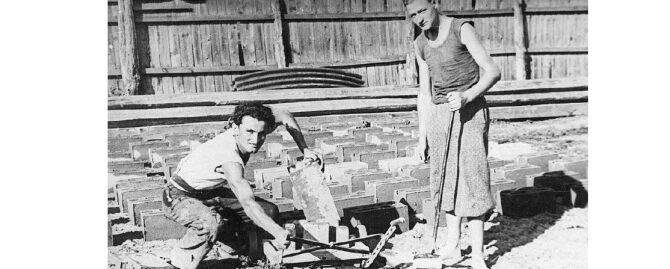
Vilna Gaon Museum Marks International Holocaust Day at Vilnius Ghetto Battle Site
Photo: Yekhiel Ilya Sheinboim, right, from Yad Vashem.
The Vilna Gaon Jewish History Museum is marking International Holocaust Day Sunday, January 28 in front of the apartment building on the former Strashun street inside the Vilnius ghetto, now Žemaitijos street no. 8, where the only street battle inside the ghetto between ghetto partisans versus Estonian Waffen-SS with German forces broke out during the two-week-long liquidation of the ghetto. This is where the Nazis blew up one building and barricaded streets, and Jewish partisan leader Yekhiel Ilya Sheinboim fired on the enemy from a balcony before being felled by a volley from up the street. Yekhiel was originally from Odessa and formed an underground resistance group in the Vilnius ghetto independent of the FPO, first merging with Borka Friedman’s Struggle Group to form the Yekhiel Struggle Group, and then merging with the FPO in May of 1943.
The ceremony will take place at 3:30 P.M. at Žemaitijos street no. 8, followed by a concert at the Tolerance Center at Naugarduko street no. 10 called “Windows Open to the Sun” at 5:00 P.M.

#WeRemember
The Lithuanian Jewish Community invites all members of the public to mark International Holocaust Day on January 27 by taking part in the global We Remember campaign to keep alive the memory of the six million Jews murdered in the Holocaust.
Every year the LJC addresses the Lithuanian municipalities and educational institutions requesting they join the We Remember campaign by visiting mass murder sites, maintaining grave sites, relaying the testimonies of eyewitnesses to the Holocaust and telling the horrific story which had such tragic consequences for Lithuania, Europe and the world.
On Thursday, January 25, everyone is invited to visit the mass murder site in their location to honor the victims. In Vilnius the LJC will ferry those interested by bus to the Ponar Memorial Complex where a commemoration will take place and kaddish will be performed.
The bus will leave from Pylimo street no. 4 at 11:30 A.M. sharp Thursday morning to arrive by 12 noon at Ponar. From the parking lot in Ponar a procession will make its way into the memorial complex. Later we will visit the monument to Righteous Gentiles on Maironio street in Vilnius. Register by sending an email to info@lzb.lt.
If you are unable to attend, you can still participate in the We Remember campaign:
1. Write “We Remember” on a piece of paper, card or cardboard;
2. Take a photograph of yourself or your group holding the inscription;
3. Post on social media with the hash-tag #WeRemember;
4. Send a copy to info@lzb.lt
#WeRemember
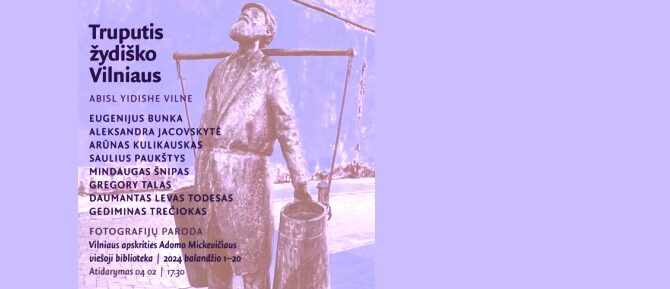
Abisl Yidishe Vilne
The Adomas Mickevičius Public Library in Vilnius is opening an exhibit of photography called Abisl Yidishe Vilne or A Bit of Jewish Vilnius with an opening ceremony at 5:30 P.M. on Tuesday, April 2. The exhibit is to feature the works of Aleksandra Jacovskytė, Daumantas Levas Todesas, Eugenijus Bunka and others. The exhibit will run till April 20, 2024. The library is located at Trakų street no. 10 in Vilnius.
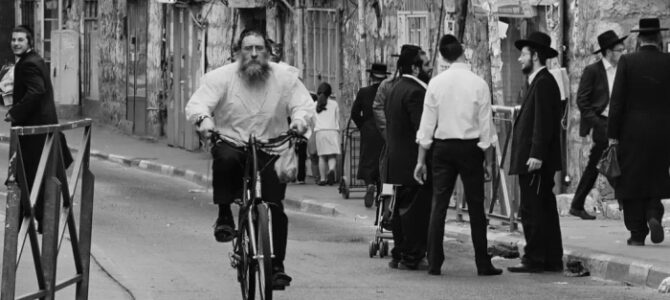
Gregory Kaplan Photography Exhibit
The Vilna Gaon Jewish History Museum is marking International Holocaust Day with an exhibition of photographs by Gregory Kaplan from Israel featuring the Mea Shearim enclave/neighborhood of Ultra-Orthodox believers in near the Old City in Jerusalem. The exhibit opens at 6:00 P.M. on Wednesday, January 31, at the Samuel Bak Museum inside the Tolerance Center located at Naugarduko street no. 10 in Vilnius.
In their press release, the Vilna Gaon Museum quoted Kaplan and stated:
“Mea Shearim, the ultra-Orthodox district of Jerusalem, an island of the past enduring a world of triumphant artificial intelligence. ‘I take pictures with a Nicon [sic]. I am a loner, and my works are short stories that I hope are interesting not only to me but to others too.’ (Gregory Kaplan).”
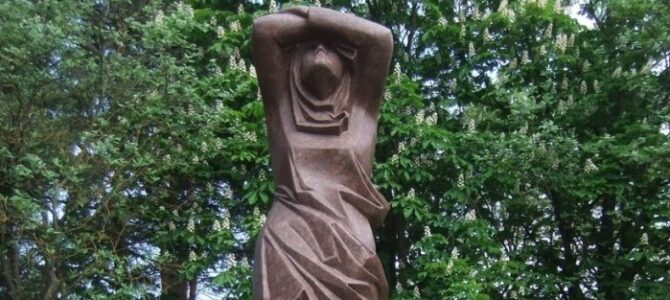
International Day of Commemoration in Memory of the Victims of the Holocaust in Panevėžys
The Panevėžys Jewish Community invites you to remember the victims of the Holocaust at a special event to mark International Holocaust Day, January 27. The event in Panevėžys is being held the day before on January 26 starting with a public gathering at ~1:00 P.M. in front of the Sad Jewish Mother monument on Memory Square in the northern Lithuanian city.
Program:
1:00 P.M. opening ceremony and wreath-laying ceremony at Sad Jewish Mother monument, presentations including from Panevėžys city mayor Rytis Račkausas, Panevėžys regional administration mayor Antanas Pocius, students and honored guests.
2:00 P.M. back at Panevėžys Jewish Community headquarters, a conference with Panevėžys Jewish Community members and partners and screenings of Holocaust films.
Please signal your intent to attend by calling+370 61120882 or +370 61017608 or by emailing genakofman@yahoo.com.

